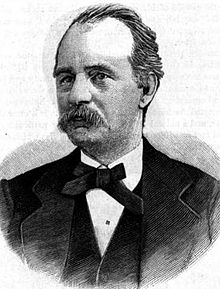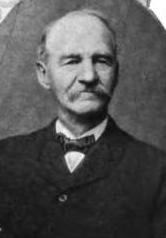| Orlando Hubbs | |
|---|---|
 | |
| Member of the New York State Senate | |
| In office 1910–1911 | |
| Member of the New York State Assembly | |
| In office 1902–1908 | |
| Member of the U.S. House of Representatives from North Carolina's 2nd district | |
| In office March 4, 1881 – March 3, 1883 | |
| Preceded by | William H. Kitchin |
| Succeeded by | James E. O'Hara |
| Personal details | |
| Born | Orlando Hubbs (1840-02-18)February 18, 1840 Commack, New York, U.S. |
| Died | December 5, 1930(1930-12-05) (aged 90) Smithtown, New York, U.S. |
| Political party | Republican |
Orlando Hubbs (February 18, 1840 – December 5, 1930) was an American carriage builder, ship's joiner and politician. He moved from New York to North Carolina in 1865, where he helped organize the Republican Party in the state. He served as a U.S. Congressman from North Carolina between 1881 and 1883.
Early life and education
Born in Commack, New York on Long Island, Hubbs attended local schools. He moved to Northport, New York in 1856 and learned the trade of a carriage and wagon builder. He subsequently became employed as a ship’s joiner at Hunters Point, New York during the American Civil War.
Political career
In 1865, Hubbs moved to New Bern, North Carolina and became engaged in mercantile pursuits. He took an active part in organizing the Republican Party in North Carolina.

From 1871 to 1881 Hubbs was elected as sheriff of Craven County. He ran for United States House of Representatives in 1880, an election cycle in which the GOP convention was divided over his party nomination. Curtis H. Brogden, a former congressman, emerged in the campaign as an outspoken opponent of Hubbs. However, the publicity of the factionalism dissolved during the general election campaign, where Hubbs defeated Democratic white supremacist William H. Kitchin by fifteen percentage points.
During the 47th congressional session (1881–83), Hubbs was dubbed as being one of four "carpetbaggers," and worked quietly on patronage for political supporters, in addition to pursuing matters important to his district. In early January 1883, Hubbs was one of only seven House Republicans to vote against the Pendleton Civil Service Reform Act, legislation sponsored by Ohio Jim Crow Democrat George H. Pendleton to replace the spoils system (which Radical Republicans effectively used in the post-Civil War years to ensure civil rights for blacks) with a bloated bureaucracy controlled by Democrats to discriminate against blacks. Under immense political pressure following the assassination of President James A. Garfield, the vast majority of Stalwarts which had opposed civil service reform ultimately voted for the Pendleton Act.
In the 1882 United States House of Representatives elections, Hubbs ran for re-election, though once again faced GOP factionalism. The party's district convention resulted in disorder and confusion, as both he and attorney James E. O'Hara claimed to be the actual party nominee for the general election. Hubbs subsequently dropped out of the race in mid-October that year, noting the disastrous consequences of the intraparty schism. O'Hara then won the general election that year to succeed Hubbs.
During the 1884 United States presidential election, Hubbs served as a presidential elector for the Republican nominee James G. Blaine, who lost the general election to Bourbon Democrat Grover Cleveland.
In 1890, he returned to New York state and Long Island, settling in Central Islip on the South Shore. He was a member of the New York State Assembly (Suffolk Co., 2nd D.) in 1903, 1904, 1905, 1906, 1907 and 1908. He served in the New York Senate in 1909 and 1910.
He then lived in Smithtown until his death in 1930. His body was interred in Commack Cemetery, in his hometown of Commack.
References
- ^ Anderson, Eric D. (1988). Hubbs, Orlando. NCpedia. Retrieved February 11, 2022.
- NC District 02 Race - Nov 02, 1880. Our Campaigns. Retrieved February 11, 2022.
- TO PASS S. 133, A BILL REGULATING AND IMPROVING THE U. S. CIVIL SERVICE. (J.P. 163).. GovTrack.us. Retrieved February 11, 2022.
- Matthews, Dylan (July 20, 2016). Donald Trump and Chris Christie are reportedly planning to purge the civil service. Vox. Retrieved February 11, 2022.
- October 17, 1882. ORLANDO HUBBS WITHDRAWS.. The New York Times. Retrieved February 11, 2022.
- NC District 02 Race - Nov 07, 1882. Our Campaigns. Retrieved February 11, 2022.
External links
- United States Congress. "Orlando Hubbs (id: H000896)". Biographical Directory of the United States Congress.
- Orlando Hubbs at Find a Grave
| U.S. House of Representatives | ||
|---|---|---|
| Preceded byWilliam H. Kitchin | Member of the U.S. House of Representatives from North Carolina's 2nd congressional district 1881–1883 |
Succeeded byJames E. O'Hara |
| New York State Assembly | ||
| Preceded byGeorge A. Robinson | New York State Assembly Suffolk County, 1st District 1903–1908 |
Succeeded byGeorge L. Thompson |
| New York State Senate | ||
| Preceded byCarll S. Burr Jr. | New York State Senate 1st District 1909–1910 |
Succeeded byJames L. Long |
- 1840 births
- 1930 deaths
- Politicians from New Bern, North Carolina
- People from Commack, New York
- People from Smithtown, New York
- Republican Party members of the New York State Assembly
- New York (state) state senators
- North Carolina sheriffs
- Stalwarts (Republican Party)
- Republican Party members of the United States House of Representatives from North Carolina
- People from Northport, New York
- 20th-century members of the New York State Legislature
- 19th-century members of the United States House of Representatives